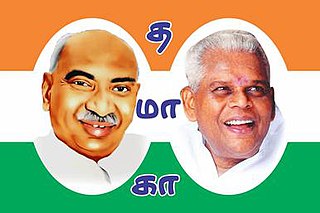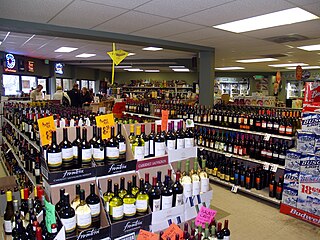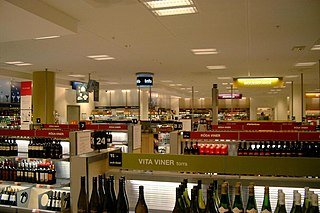
The Tamil Maanila Congress (Moopanar) (transl. Tamil State Congress (Moopanar); abbr.TMC(M)) is an Indian regional political party in the state of Tamil Nadu. It was founded by the former member of parliament of the Republic of India G. K. Moopanar on 29 March 1996 as a breakaway faction from the Tamil Nadu Congress Committee.

A liquor store is a retail business that predominantly sells prepackaged alcoholic beverages, including liquors, wine or beer, usually intended to be consumed off the store's premises. Depending on region and local idiom, they may also be called an off-licence, off-sale, bottle shop, bottle store or, colloquially, bottle-o, liquor store or other similar terms. A very limited number of jurisdictions have an alcohol monopoly. In US states that are alcoholic beverage control (ABC) states, the term ABC store may be used.

Viduthalai Chiruthaigal Katchi, formerly known as the Dalit Panthers of India or the Dalit Panthers Iyyakkam, is an Indian social movement and political party that seeks to combat caste based discrimination, active in the state of Tamil Nadu. The party also has a strong emphasis on Tamil nationalism. Its chairman is Thol. Thirumavalavan, a lawyer from Chennai, and its general secretary is the writer Ravikumar.

Tamil Nadu has the second largest economy of any state in India. The state is also the most industrialised in the country. The state is 48.40% urbanised, accounting for around 9.26% of the urban population in the country, while the state as a whole accounted for 5.96% of India's total population in the 2011 census. Services contributes to 54% to the gross domestic product of the state, followed by manufacturing at 33% and agriculture at 13%.

An alcohol monopoly is a government monopoly on manufacturing and/or retailing of some or all alcoholic beverages, such as beer, wine and spirits. It can be used as an alternative for total prohibition of alcohol. They exist in all Nordic countries except Denmark proper, and in all provinces and territories in Canada except Alberta. In the United States, there are some alcoholic beverage control states, where alcohol wholesale is controlled by a state government operation and retail sales are offered by either state or private retailers.

Tamil cinema is the segment of Indian cinema dedicated to the production of motion pictures in the Tamil language, the main spoken language in the state of Tamil Nadu. It is nicknamed Kollywood, a portmanteau of the names Kodambakkam, a neighbourhood in Chennai, and Hollywood.

Sterlite Copper is a subsidiary of Sterlite industries, a company owned by Vedanta Limited.

Sale and consumption of alcoholic liquor for human consumption is prohibited in the states of Bihar, Gujarat, Mizoram, and Nagaland. All other Indian states and union territories permit the sale and consumption of alcohol.

In Tamil Nadu, the Highways & Minor Ports Department (HMPD) is primarily responsible for construction and maintenance of roads including national highways, state highways and major district roads. HMPD was established as Highways Department (HD) in April 1946 and subsequently renamed on 30 October 2008. It operates through seven wings namely National Highways Wing, Construction & Maintenance Wing, NABARD and Rural Roads Wing, Projects Wing, Metro Wing, Tamil Nadu Road Sector Project Wing, Investigation and Designs Wing geographically spread across the state in 38 districts with about 120 divisions and 450 subdivisions.

Kerala State Beverages Corporation Ltd (BEVCO) is a public sector company fully owned by the Government of Kerala, it started under Civil Supplies Department in 1984 under the Minister N Sreenivasan, K Karunakaran Ministry. Since then BEVCO has the authority under the Abkari Act & allied Rules for the wholesale and retail vending of alcoholic liquor in Kerala. It controls the retail sales of Indian Made Foreign Liquor (IMFL) and Beer in the state.

Chennai Trade Centre is a permanent exhibition complex in Nandambakkam, Chennai, hosting several trade fairs and conventions round the year. It is the first fair infrastructure that has been developed by India Trade Promotion Organisation (ITPO)—the premier trade promotion agency of the Government of India, Ministry of Commerce and Industry—outside Delhi. A joint initiative of the ITPO and the Tamil Nadu Trade Promotion Organisation, which hold 51 and 49 percent stakes, respectively, the Trade Centre was designed by C R Narayan Rao, and was commissioned in January 2001, while the convention centre was commissioned on 1 November 2004. The exhibition hall was constructed at an estimated cost of ₹ 23 crore and the convention centre at a cost of ₹ 22 crore. Together, these centres cover 10,560 sq m and are fully booked for 75 days in a year. Built over an area of 25.48 acres, the centre comprises four modules of 4,400 m2 each of exhibition halls and support services to be built in a phased manner. In the first phase, two air-conditioned halls without pillars or columns encompassing areas of 5,000 m2 and 1,850 m2 were constructed. There are three halls, viz, Hall No. 1 (4,400 m2), Hall No. 2 (1,760 m2) and Hall No. 3 (4,400 m2). The halls feature a height of 6 m to display all merchandise including machinery. These have been supplemented recently with a modern, fully air-conditioned convention centre. All the halls are inter-linked, and Hall No. 3 is connected with the convention centre. The convention centre can accommodate 2,000 people with a provision for dividing the hall into two equal parts and has an audiovisual facility suitable for multi-purpose use such as conferences, conventions, cultural shows, and so forth. The Chennai Trade Centre is managed by Tamil Nadu Trade Promotion Organisation (TNTPO), a joint venture of ITPO and Tamil Nadu Industrial Development Corporation (TIDCO).

The Tamil Nadu Fire and Rescue Services department is a service department of the Government of Tamil Nadu whose function is to fight fires and provide relief measures in times of calamities and disasters in Tamil Nadu.
Road collisions in Tamil Nadu, a state in South India, are among the highest in India. In 2013, the state recorded 15,563 fatalities in the 14,504 recorded collisions, the highest for any state in India. The state also topped the list of most collisions in a state for all previous 18 years from 2002 to 2020. According to the report of two experts published in the International Journal of Research in Management and Technology, driving under the influence of alcohol accounts for 82 per cent of collision fatalities in India. A few political leaders have vehemently opposed the state-run TASMAC shops that sell alcohol and have called for a total prohibition of alcohol in the state, but opposing governments have maintained that prohibition would lead to illegal liquor, which in the past has claimed hundred of lives. The increase in number of vehicles from 82 lakh in 2007 to 1.6 crore in 2012 without appreciable change in the road infrastructure is also believed to the reason for most collisions.
Sasi Perumal was a Gandhian activist and anti-liquor activist from Salem, Tamil Nadu. He protested for the enforcement of prohibition in Tamil Nadu for over four decades. He died near Marthandam in Kanyakumari after staging a demonstration atop a BSNL tower for the removal of a TASMAC outlet near a church at Unnamalaikkadai.

The 2015 Chennai floods resulted from heavy rainfall generated by the annual northeast monsoon in November–December 2015. They affected the Coromandel Coast region of the South Indian states of Tamil Nadu and Andhra Pradesh. More than 500 people were killed and over 1.8 million people were displaced. With estimates of damages and losses ranging from nearly ₹200 billion (US$2 billion) to over ₹1 trillion (US$12 billion), the floods were the costliest to have occurred in 2015, and were among the costliest natural disasters of the year.
Alcohol prohibition in Tamil Nadu is governed by the State Prohibition and Excise department as per the Tamil Nadu Prohibition Act, 1937. TASMAC, a state government-owned company, controls the wholesale and retail vending of alcoholic beverages in the State. On 24 May 2016, after her swearing-in, J. Jayalalitha announced the closing of 500 liquor shops and the reduction of the business hours of State-run liquor shops across the State. On 20 February 2017, the first office order signed by the Chief Minister Edappadi K. Palaniswami was the closure of 500 liquor outlets owned by the public sector TASMAC. This is in addition to the 500 liquor outlets closed down by late Chief Minister J Jayalalithaa in May 2016.

Tamil Nadu Global Investors Meet (TNGIM) is a business summit organized by Government of Tamil Nadu to facilitate domestic and foreign investments in the state. The first of these summits took place in 2015 and later in 2019. The next meet is scheduled to take place in January 2024.
The first case of the COVID-19 pandemic in the Indian state of Tamil Nadu was reported on 7 March 2020.
The 2024 Tamil Nadu alcohol poisoning took place in Kallakurichi district in the southern Indian state of Tamil Nadu on 20 June 2024. Consumption of illegally made liquor resulted in at least 65 deaths and more than 200 injuries.















